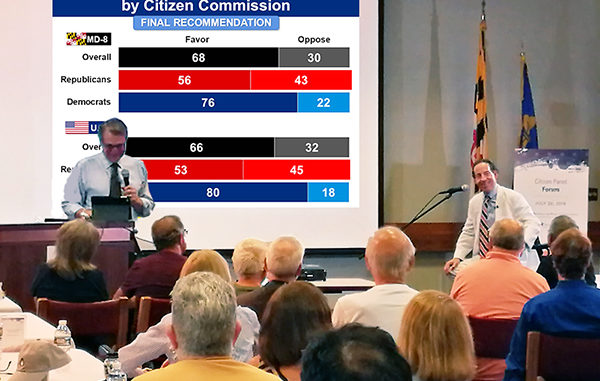
In a unique survey of 600 residents of Maryland’s 8th Congressional District, majorities of Republicans and Democrats agreed on ways to deal with gerrymandering, curb the influence of money in politics, and enact changes to make elections better represent the will of voters.
The survey results were released at a “Citizen Panel Forum” in Rockville on Saturday. Congressman Jamie Raskin attended and discussed the findings with dozens of the residents of the 8th District who took the online survey.
The online survey, conducted by the Program for Public Consultation (PPC) of the School of Public Policy at the University of Maryland, showed that large bipartisan majorities favored a number of reforms under consideration in Congress to address the role of money in elections including:
- reforming campaign finance by encouraging donations by small donors,
- strengthening requirements for public disclosure of campaign donations and expenditures,
- a Constitutional amendment that would overturn the Supreme Court’s Citizens United case
Bipartisan majorities also supported reforms to the way Congress is elected, including countering gerrymandering by having a citizen commission design Congressional districts instead of state legislatures, ranked choice voting and multi-member districts. A proposal for the government to match small donations drew a divided response.
Detail on the survey findings can be found at http://www.publicconsultation.org/wp-content/uploads/2019/07/Government_Reform_Quaire_MD8_072019.pdf .
“This is exactly what we need all over the country,” said Raskin. “I would like to get back to the kind of Congress where there are these kinds of conversation.”
“In standard town hall meetings, a member of Congress puts forward their views and citizens respond,” added PPC Director Steven Kull. “But in a Citizen Panel Forum, the views of a representative sample of citizens are first put forward, then the member responds and there is a discussion.”
Six hundred Maryland voters from the 8th District participated in the online survey, initiated by the nonpartisan organizations Voice of the People and Common Ground Solutions. Respondents went through a process called a ‘policymaking simulation’ that gives users information and seeks to put them in the shoes of a policymaker. Respondents are provided a briefing, presented with pro and con arguments, and then asked to weigh-in with their specific budget and tax recommendations. The content was reviewed in advance by Congressional staffers from both parties and other experts to assure accuracy and balance.
“It was satisfying to be able to voice my opinion by this survey,” one participant said. “I’d do it again.”
The survey and the citizen panel forum are part of a larger Citizen Panel Initiative, sponsored by Voice of the People and Common Ground Solutions, that seeks to give citizens tools to more effectively understand and weigh in on decisions before Congress, to give members of Congress a better understanding of their constituents, and to discern the potential for bipartisan convergence.
The proposals that received the highest levels of support were ones that required greater public disclosure of campaign-related donations to counter what critics call ‘dark money.’ For example, 77 percent (Republicans 70 percent, Democrats 82 percent) favored a proposal to require that individuals and or organizations that donate $10,000 or more to register with the Federal Election Commission and have their name and the amount of their donations listed on the FEC’s website.
To counter the influence of large campaign donors, 62 percent (Republicans 57 percent, Democrats 68 percent) favored giving a tax credit for donations of up to $50 for a specific candidate by donors who donate a total of no more than $300 to all candidates.
Seventy-two percent (Republicans 64 percent, Democrats 76 percent) supported a Constitutional amendment to effectively overturn the Supreme Court’s Citizens United decision and allow Congress to directly regulate campaign financing, and treat corporations differently than individuals in regard to campaign donations.
Proposals from the proposed Fair Representation Act for reforming the way Congress is elected also gained support. Sixty-eight percent supported having a citizen commission design congressional districts to counter the potential of gerrymandering, (56 percent of Republicans and 76 percent of Democrats). Ranked choice voting—also know as instant run-off voting—was supported by 66 percent (Republicans 54 percent, Democrats 73 percent). Having larger Congressional districts with 3-5 members (to increase the odds of more partisan diversity in representation) was favored by 58 percent (Republicans 52 percent, Democrats 62 percent).
Half of the Maryland 8 panel provided by Precision Sample, from its larger opt-in internet panel. The other half was recruited by the Program for Public Consultation, using email addresses provided by L2 Political. The sample was weighted by age, education, gender and ethnicity using benchmarks for Maryland’s 8th Congressional District that were obtained from the Census Bureau’s American Community Survey. The partisan balance was weighted according to the distribution of registrations from the Maryland Board of Elections.
The views expressed in Maryland’s 8th District were quite similar to those in nationwide surveys with samples of more than 2,000 voters provided by Nielsen Scarborough.
- Government Reform Questionnaire with MD8 and U.S. National Frequencies: http://www.publicconsultation.org/wp-content/uploads/2019/07/Government_Reform_Quaire_MD8_072019.pdf
- Government Reform Survey Slides with MD8 and U.S. National Results: http://www.publicconsultation.org/wp-content/uploads/2019/07/Govt_Reform_MD8_web_072018.pdf
- Members of the public can go through the same policymaking simulation at: https://www.surveygizmo.com/s3/5119366/Government-Reform.

Be the first to comment